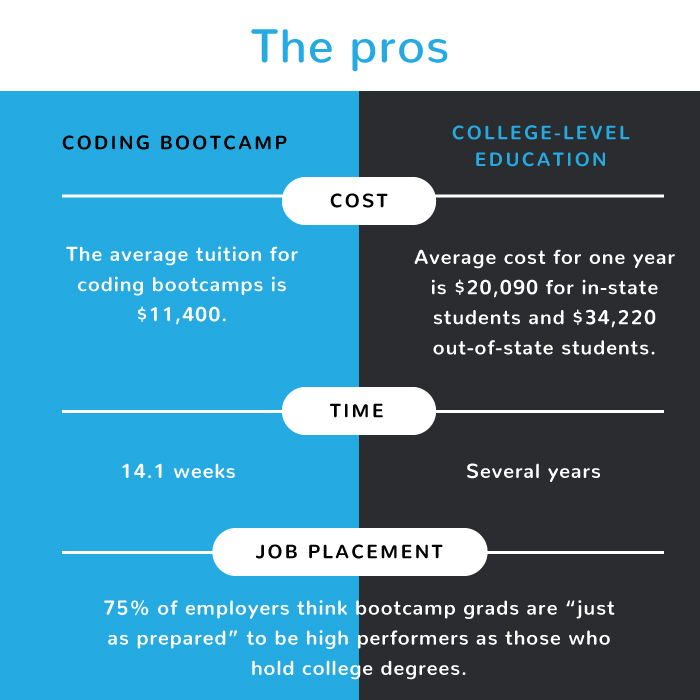Intensity of Learning

Coding bootcamps and entry-level coding jobs both demand significant dedication, but the nature and intensity of that demand differ considerably. Bootcamps are characterized by a highly concentrated, fast-paced learning environment, while entry-level positions typically involve a more gradual learning curve integrated within the daily workflow of a company. Understanding these differences is crucial for prospective students weighing their options.
Are coding bootcamps harder than jobs – The primary distinction lies in the sheer volume of information absorbed within a compressed timeframe in bootcamps. Daily workloads are intense, often requiring long hours of study and project work. In contrast, entry-level jobs, while demanding, usually allow for a more manageable learning pace, with opportunities to learn incrementally on the job, supported by experienced colleagues and established processes.
Learning Pressures in Bootcamps and Entry-Level Jobs
Bootcamps create a high-pressure environment fueled by tight deadlines for projects and the competitive nature of the cohort. Students experience significant peer pressure, striving to keep pace with their classmates and demonstrate proficiency. The pressure is largely self-imposed, driven by the desire to secure a job after graduation. Entry-level jobs, conversely, introduce a different kind of pressure. Deadlines exist, but they are typically less immediate and more structured. Performance expectations are defined within a team context, with more established support systems and mentorship opportunities. The pressure is more externally driven, based on meeting company goals and expectations.
Comparative Analysis of Learning Intensity
The following table summarizes the key differences in learning intensity between coding bootcamps and entry-level coding jobs:
| Aspect | Bootcamp | Job | Comparison |
|---|---|---|---|
| Hours per day | 6-12+ hours (including self-study) | 6-8 hours (with potential overtime) | Bootcamps demand significantly more daily hours, reflecting the condensed learning schedule. |
| Learning Style | Intensive, fast-paced, project-based | Gradual, on-the-job training, mentorship-driven | Bootcamps prioritize rapid skill acquisition, while jobs focus on practical application and continuous learning. |
| Support Systems | Instructors, teaching assistants, cohort peers | Team members, supervisors, company resources | Bootcamps offer structured support, while jobs provide a more integrated and often less formalized support structure. |
| Deadlines | Frequent, short-term project deadlines | Longer-term project deadlines, release cycles | Bootcamp deadlines are more immediate and frequent, while job deadlines are typically longer and more strategically planned. |
| Assessment | Regular assessments, projects, final projects | Performance reviews, project milestones, code quality | Bootcamps emphasize frequent evaluation of skills, while jobs focus on performance relative to overall team goals. |
Time Commitment and Work-Life Balance: Are Coding Bootcamps Harder Than Jobs

Coding bootcamps and entry-level developer roles both demand significant time investment, but the nature and impact on work-life balance differ considerably. Bootcamps are intense, short-term commitments requiring a near-total focus, while entry-level jobs, while demanding, generally offer a more structured and predictable schedule with clearer boundaries between work and personal life.
Bootcamps typically involve a far greater time commitment than a standard entry-level job. While a junior developer might work a standard 40-hour week, bootcamp students often dedicate significantly more time, often exceeding 50-60 hours per week, encompassing lectures, hands-on projects, homework assignments, and independent study. The pressure to succeed and secure a job after graduation further intensifies this commitment, often leading to extended hours spent on job applications and portfolio building. In contrast, a junior developer’s work hours are typically more defined, although overtime may occasionally be required depending on project deadlines and company culture.
Time Commitment Comparison, Are coding bootcamps harder than jobs
A typical day in a coding bootcamp might begin with a morning lecture covering a specific programming concept, followed by several hours of hands-on coding exercises and group projects. Lunch breaks are often short and squeezed in between intense sessions. The afternoon might involve more lectures, followed by individual coding challenges and personal projects. Evenings are typically dedicated to completing assignments, researching concepts further, or working on portfolio projects. Weekends are often utilized to catch up on coursework or to work on personal projects. Free time is minimal and often fragmented.
In contrast, a typical workday for a junior developer usually involves a more structured schedule. There’s a clear start and end time, with breaks allocated throughout the day. While the work itself can be demanding and require long hours during critical project phases, the overall work-life balance is generally better defined. Evenings and weekends are typically free from work-related commitments, allowing for a more sustainable lifestyle. This difference in structure and predictability contributes to a significant contrast in work-life balance. A junior developer has more control over their time outside of work hours, allowing for personal activities, social engagements, and relaxation. The intense, immersive nature of a bootcamp severely restricts this flexibility during the program’s duration.


Tim Redaksi